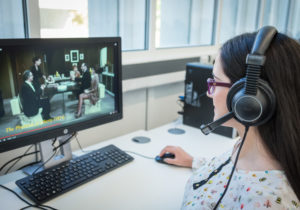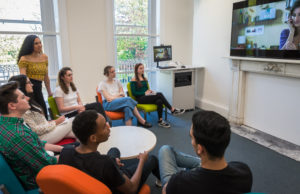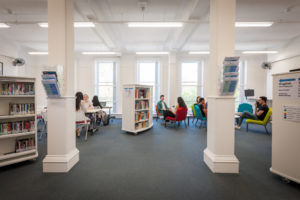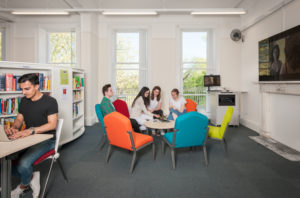How you'll learn
You will experience a mix of lectures, seminars, workshops and tutorials, with no modules being taught entirely through lectures. Most teaching takes place in small groups where you’ll share and explore ideas with your tutors and peers. You’ll also attend workshops and lectures and self-direct study through the course reading list and conducting research for your essays and projects. Academic staff are available on a weekly basis for one-to-one feedback and support through designated office hours. Course material is available 24-hours a day on Canvas, our online learning platform, and study support is available from our dedicated student services team.
Audio-visual materials are obviously inherent in a film studies course: all films are shown to students once in quasi-cinema conditions, and DVD copies are available for subsequent private study.
Students are also expected to make regular use of our fully-refurbished Language Lounge which houses a range of Film Studies material to enhance their own study. We encourage our students to become independent learners, and support them through our dedicated library resources in the Sydney Jones Library which is open 24-hour in term time.
How you're assessed
Assessment strategies vary with different modules; apart from traditional written examinations and assessed essays, assignments may include close analysis of short pieces of film text, sometimes in exam conditions; presentations undertaken either individually or as part of a group; the preparation of case studies around a particular audio-visual project; blog entries; brief reports; literature reviews and others. We are constantly reviewing our assessment strategies with the aim of offering a variety which allow students to develop different skills. The length and complexity of coursework assessments increases from year one, where written work is brief and skills are developed at a basic level, to year three when students are expected to produce quite complex work involving substantial individual initiative.
Liverpool Hallmarks
We have a distinctive approach to education, the Liverpool Curriculum Framework, which focuses on research-connected teaching, active learning, and authentic assessment to ensure our students graduate as digitally fluent and confident global citizens.
The Liverpool Curriculum framework sets out our distinctive approach to education. Our teaching staff support our students to develop academic knowledge, skills, and understanding alongside our graduate attributes:
- Digital fluency
- Confidence
- Global citizenship
Our curriculum is characterised by the three Liverpool Hallmarks:
- Research-connected teaching
- Active learning
- Authentic assessment
All this is underpinned by our core value of inclusivity and commitment to providing a curriculum that is accessible to all students.







